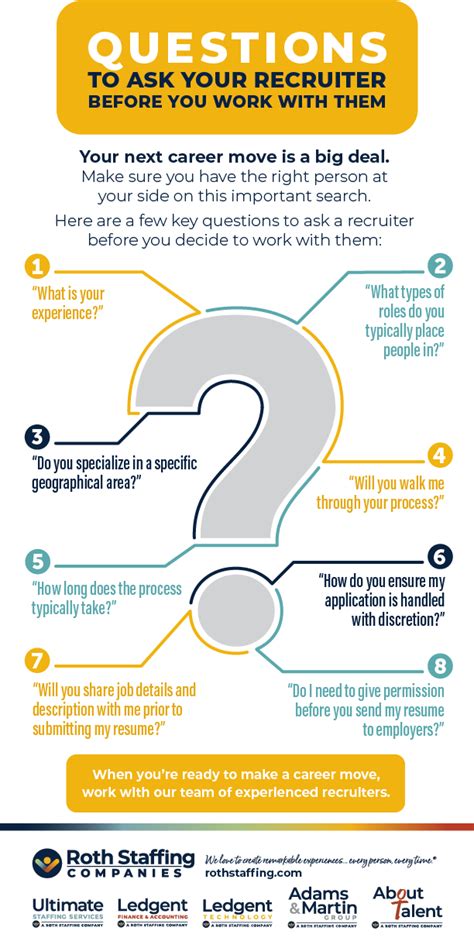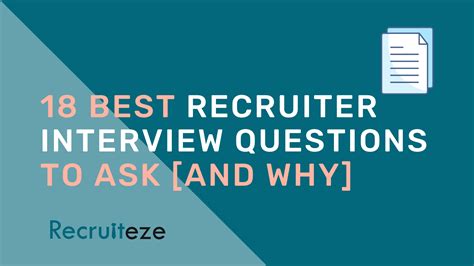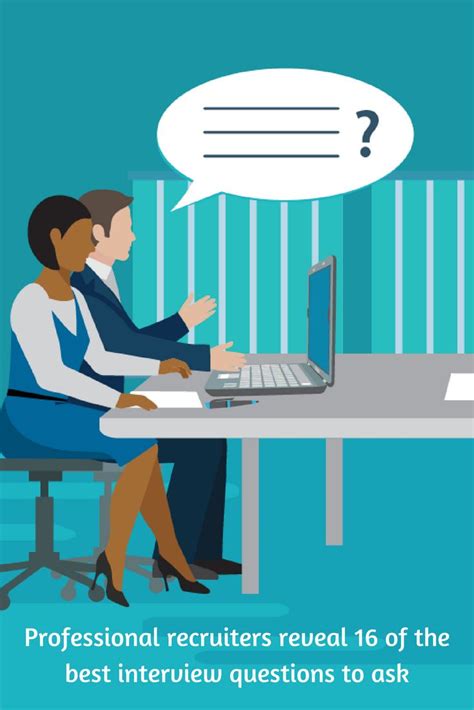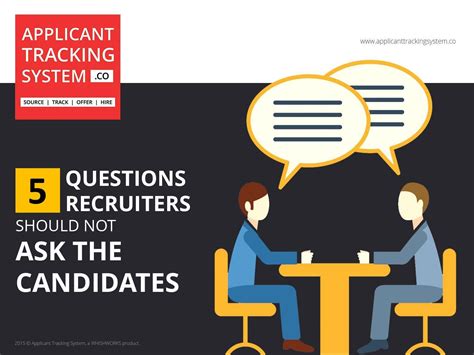5 Questions a Recruiter Will Ask

Preparing for a Job Interview: 5 Questions a Recruiter Will Ask

When preparing for a job interview, it’s essential to anticipate the types of questions a recruiter will ask. This will help you prepare thoughtful responses, showcasing your skills, experience, and fit for the role. In this article, we’ll explore five common questions recruiters ask during job interviews, along with tips on how to answer them effectively.
1. Can You Tell Me a Little About Yourself?

This question is often used as an icebreaker to get the conversation started. However, it’s also an opportunity for the recruiter to assess your communication skills, confidence, and ability to summarize your experience and qualifications.
Tips for answering:
- Keep your response brief and concise (around 1-2 minutes).
- Focus on your professional experience, skills, and achievements.
- Avoid talking about your personal life or hobbies.
- Use this opportunity to highlight your relevant skills and experience.
Example answer:
“With [number of years] years of experience in [industry/field], I’ve developed a strong background in [key skills or areas of expertise]. Most recently, I’ve been working at [current/previous company], where I’ve [briefly describe your job responsibilities and achievements]. I’m excited about the opportunity to bring my skills and experience to a new role and contribute to the success of your organization.”
2. What Are Your Strengths and Weaknesses?

This classic interview question is used to assess your self-awareness, honesty, and ability to identify areas for improvement.
Tips for answering:
- Be honest about your strengths and weaknesses.
- Frame your weaknesses as areas for improvement or skills you’re actively developing.
- Highlight your strengths and provide specific examples of how they’ve helped you achieve success in your previous roles.
- Avoid clichés or generic answers.
Example answer:
“One of my greatest strengths is my attention to detail. In my previous role, I was responsible for [project/task], and I was able to deliver high-quality results by [briefly describe your process]. One area I’m actively working to improve is my public speaking skills. While I’m comfortable communicating in writing, I recognize the importance of effective verbal communication in a leadership role. To address this, I’ve been taking courses and seeking feedback from colleagues on my presentation skills.”
3. Why Do You Want to Work for Our Company?

This question shows that you’ve done your research on the company and are genuinely interested in the role and organization.
Tips for answering:
- Show that you’ve done your research on the company’s mission, values, and products/services.
- Explain how your skills and experience align with the company’s goals and objectives.
- Highlight what you can bring to the organization and how you can contribute to its success.
- Avoid generic answers or focusing solely on the company’s reputation or salary.
Example answer:
“I’ve been impressed by [Company Name]’s commitment to [aspect of company’s mission or values that resonates with you]. As someone with a passion for [related field], I appreciate the company’s focus on [specific initiative or project]. With my skills and experience in [key areas], I believe I can make a valuable contribution to the team and help drive success. I’m excited about the opportunity to be part of a company that shares my values and is dedicated to making a positive impact.”
4. Where Do You See Yourself in Five Years?

This question is used to assess your career aspirations, level of ambition, and willingness to grow with the company.
Tips for answering:
- Be honest about your career goals and aspirations.
- Show that you’ve thought about your long-term career prospects and how this role fits into your overall career plan.
- Highlight your willingness to learn, grow, and take on new challenges.
- Avoid giving a generic answer or saying you want to be in a leadership role without explaining why.
Example answer:
“In the next five years, I see myself continuing to grow and develop as a professional in [industry/field]. I’m excited about the opportunity to take on new challenges and responsibilities, and I believe this role at [Company Name] is an important step in my career journey. I’m looking to develop my skills in [specific areas] and contribute to the company’s success in meaningful ways. Ultimately, I hope to be in a leadership role where I can mentor and inspire others, but for now, I’m focused on learning and growing with the company.”
5. Why Are You Leaving Your Current Job (or Why Did You Leave Your Previous Job)?

This question is used to assess your reasons for leaving a previous role and whether you’re looking for a new challenge or fleeing a difficult situation.
Tips for answering:
- Be honest about your reasons for leaving, but frame them in a positive light.
- Avoid speaking negatively about your previous employer or colleagues.
- Highlight what you’re looking for in a new role and how this position aligns with your goals and aspirations.
- Show that you’re proactive and excited about new opportunities.
Example answer:
“I’m leaving my current job because I’m looking for new challenges and opportunities to grow as a professional. While I’ve enjoyed my time at [Previous Company], I feel like I’ve plateaued and am ready for a new chapter in my career. I’m excited about the opportunity to join [Company Name] and contribute to the team’s success. I’m looking for a role that will challenge me and allow me to develop my skills in [specific areas], and I believe this position aligns with my goals and aspirations.”
💡 Note: Remember to be honest and authentic in your responses. The recruiter wants to get to know you and understand how you'll fit in with the company culture and team.
By preparing thoughtful responses to these common interview questions, you’ll be able to showcase your skills, experience, and fit for the role, and increase your chances of success in the interview process.
What’s the most important thing to remember when answering interview questions?

+
Be honest and authentic in your responses. The recruiter wants to get to know you and understand how you’ll fit in with the company culture and team.
How should I prepare for a job interview?

+
Research the company, review the job description, practice answering common interview questions, and prepare any materials you may need, such as copies of your resume and references.
What should I wear to a job interview?

+
Dress professionally and conservatively. Avoid bold patterns, bright colors, and excessive jewelry. Stick to neutral colors and classic styles that convey confidence and professionalism.
Related Terms:
- Recruiter questions to ask candidates